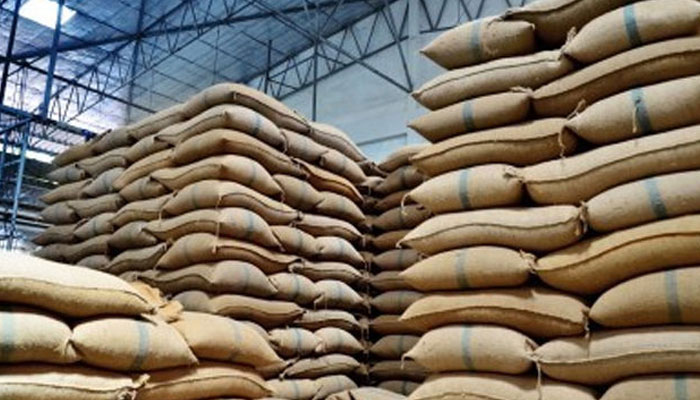Govt urged to fully deregulate wheat supply chain
LAHORE: As wheat harvesting reaches its peak in Pakistan, the flour milling industry is calling for a market-driven approach to the procurement and distribution of grain. Advocates of deregulation argue that allowing the entire wheat supply chain to operate independently would lead to greater efficiency and equity, ultimately benefiting farmers, processors and consumers alike.
President of the Progressive Flour Millers Group Majid Abdullah emphasised the importance of moving away from government intervention in wheat markets to unlock the sector’s true potential. He shared the following insights on the need to reform the system and foster sustainable growth:
“A genuinely deregulated market can only emerge if the government withdraws from direct involvement and allows prices to be determined by supply and demand,” said Abdullah. “The current system restricts progress.”
Pakistan’s wheat procurement and price support system -- introduced in the late 1950s -- has historically ensured support for small farmers and affordable flour for urban consumers. However, it has now become fiscally unsustainable due to rising subsidies, which impose a heavy burden on the national treasury. Furthermore, the system has become vulnerable to favouritism and elite capture, particularly in the allocation of gunny bags and wheat distribution to flour mills.
Abdullah highlighted the urgent need for reforms, citing the government’s poorly coordinated withdrawal from wheat procurement as a key source of recent disruption. The Punjab government’s sudden cessation of procurement activities, coupled with the federal government’s failure to announce a minimum support price, has created uncertainty among stakeholders. Wheat prices collapsed from Rs3,900 to as low as Rs2,700 per 40kg, inflicting significant losses on both farmers and millers.
“To avoid such shocks in future, a deregulated wheat trade aligned with free-market principles is essential,” Abdullah said.He noted that deregulation offers extensive benefits, including enhanced responsiveness to market demand, improved storage infrastructure by the private sector, and better-targeted government support for vulnerable populations. A deregulated environment could unlock export potential for wheat and wheat-based products, bringing in much-needed foreign exchange.
Despite these advantages, the private sector remains apprehensive due to the lack of clear legislation to protect its role in the wheat economy. The Punjab government’s recent transformation of its food department into the Punjab Price Control and Commodities Management Department (PCCMD) has raised fresh concerns. Price control measures -- such as a Rs3,000 per 40kg price cap in wholesale markets -- have reportedly led to financial losses for millers, undermining their confidence in the government’s commitment to deregulation.
Abdullah urged the government to support a smooth transition by allowing free trade without conditions. This includes helping the private sector improve storage capacity and meet banking requirements. He also called for the development of a comprehensive wheat export strategy to capitalise on international opportunities.
“Deregulating the wheat supply chain is essential for creating a more efficient and equitable market,” Abdullah said. “The government must adopt a market-driven approach and give a clear commitment that the previous system of procurement, storage, and distribution will not be reinstated -- even in the event of a political transition.”Such assurances, he added, would provide the stability and confidence necessary for the private sector to invest and grow within Pakistan’s wheat industry.
-
 China: Stunning Drone Show Lights Up Night Sky Ahead Of Spring Festival 2026
China: Stunning Drone Show Lights Up Night Sky Ahead Of Spring Festival 2026 -
 Andrew's Epstein Scandal: Will King Charles Abdicate Following King Edward's Footsteps?
Andrew's Epstein Scandal: Will King Charles Abdicate Following King Edward's Footsteps? -
 Billy Joel Leaves Loved Ones Worried With His 'dangerous' Comeback
Billy Joel Leaves Loved Ones Worried With His 'dangerous' Comeback -
 Prince William Dodges Humiliating Question In Saudi Arabia
Prince William Dodges Humiliating Question In Saudi Arabia -
 Dax Shepard Describes 'peaceful' Feeling During Near-fatal Crash
Dax Shepard Describes 'peaceful' Feeling During Near-fatal Crash -
 Steve Martin Says THIS Film Has His Most Funny Scene
Steve Martin Says THIS Film Has His Most Funny Scene -
 Kensington Palace Shares Update As Prince William Continues Saudi Arabia Visit
Kensington Palace Shares Update As Prince William Continues Saudi Arabia Visit -
 Fugitive Crypto Scammer Jailed For 20 Years In $73m Global Fraud
Fugitive Crypto Scammer Jailed For 20 Years In $73m Global Fraud -
 Will Andrew Mountbatten-Windsor Finally Go To Jail Now That King Charles Has Spoken Out? Expert Answers
Will Andrew Mountbatten-Windsor Finally Go To Jail Now That King Charles Has Spoken Out? Expert Answers -
 Melissa McCarthy Reveals Her Tried And Tested ‘corpse’ Night Time Routine That’s Lost Her 95lbs
Melissa McCarthy Reveals Her Tried And Tested ‘corpse’ Night Time Routine That’s Lost Her 95lbs -
 Horrifying Pictures Of The Kidnapper Of Savannah Guthrie's Mother Released
Horrifying Pictures Of The Kidnapper Of Savannah Guthrie's Mother Released -
 Andrew's Ex-girlfriend Launches Brazen Attack On Epstein Victims On Piers Morgan Show
Andrew's Ex-girlfriend Launches Brazen Attack On Epstein Victims On Piers Morgan Show -
 Andrew Mountbatten-Windsor 'on His Own' As Palace Gives Green Light To Law Enforcement
Andrew Mountbatten-Windsor 'on His Own' As Palace Gives Green Light To Law Enforcement -
 Kanye West's Tweet About Super Bowl Halftime Resurfaced After Bad Bunny's Show
Kanye West's Tweet About Super Bowl Halftime Resurfaced After Bad Bunny's Show -
 'FBI' Star Juliana Aidén Martinez Tease Her Return To 'Law And Order: SVU' After Quitting
'FBI' Star Juliana Aidén Martinez Tease Her Return To 'Law And Order: SVU' After Quitting -
 Cardi B's Emotional Words To Pal Amid Stefon Diggs Rumored Breakup Revealed
Cardi B's Emotional Words To Pal Amid Stefon Diggs Rumored Breakup Revealed




